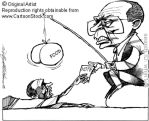From the reading and the lecture, it appears that the famous Land Redistribution in the 1980’s has been a strategy to gain legitimacy before alleviating poverty. Mugabe politics have been instrumentalist. Behind the feature of Marxist politics, the state remained a de facto instrument serving the interest of the domestic elite. The land reform that had the potential to revolutionise the country resource allocation and economic growth lacked strategy. Has the governance politics improved the last decade?
Human Development Index: Trends 1980 – present
The rhetoric of the state has sill not matched its actions. The two strong figures in the country, Robert Mugabe (ZANU-PF) and Morgan Tsvangirai (MDC-T) have shown to be opportunists rather than visionaries. Their developmental approach is imperfect. Their link with the Zimbabwe’s population has remained weak. The state has shown difficulty in balancing vested interest against good enough governance. The capacity of both men must also be questioned with regards to making the right decisions to effectively allocate the resources of the country and to ensure those resources reach the poor. The state has however implemented policies that are going in the right direction.
My worry is that developmental politics must be a comprehensive process to be efficient. There have been too many inconsistencies to affirm that the state has adopted pro-poor politics. The reality is complex though. While the wealth of diamonds mining is overwhelming used to increase personal wealth of the well-connected elite, as Professor Ian Scones pointed out, in the last decade, some poor people have benefited from the policies put in place and the situation is slowly improving. It could be considered that the state’s recent pro-poor policies are a window of opportunities. If those policies end up having a positive outcome whilst not putting at stake the elite power, opportunities to cooperate and interdependence between the elite and the poor may start to happen
One lesson that can be drawn from the Zimbabwean experience is that it has become obvious that sanctions are not fulfilling their objectives and affect the population.
In 2002/2003 I studied a Masters degree in Loughborough University. One of the students was from Zimbabwe. After a few months the government that sponsored his study was no longer able to provide the monthly money transfer to pay his fees and living expenditure. Financial transfers were no longer tolerated due to sanction. After three months, the university informed him that it was no longer possible for him to continue his Masters since sanctions were not going to be lifted. The young man committed suicide.
 This session showed how difficult it is to design and implement politics that will include the poor and reduce poverty. Domestic and international stockholders tend naturally to monopolise resources for their benefit and they are most likely to exclude the poor from the equation. Solidarity cannot happen without interdependence. How the poor can make themselves needed by the decision makers is the real challenge. In the case of Zimbabwe the session also highlighted that the quality and ambition of the elite mastermind the rule of the game and the game. The case of Zimbabwe makes me angry. It reached the eighth of greed and cupidity of local, national and international elites. I don’t want to get involve in such context.
This session showed how difficult it is to design and implement politics that will include the poor and reduce poverty. Domestic and international stockholders tend naturally to monopolise resources for their benefit and they are most likely to exclude the poor from the equation. Solidarity cannot happen without interdependence. How the poor can make themselves needed by the decision makers is the real challenge. In the case of Zimbabwe the session also highlighted that the quality and ambition of the elite mastermind the rule of the game and the game. The case of Zimbabwe makes me angry. It reached the eighth of greed and cupidity of local, national and international elites. I don’t want to get involve in such context.


![lpen30l[1]](https://devpolitics.files.wordpress.com/2011/03/lpen30l12.png?w=300&h=213)
